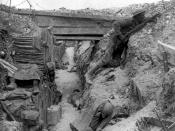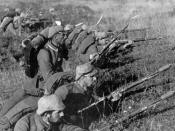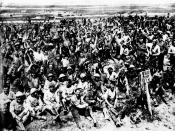World War I (1914-1920) was the war that Europe expected. It was the war that would "end all wars." Europe took up 7% of the earth's surface and dominated a large amount of the world's trade. They were actively exporting both its goods and culture all over the globe. Europe assumed they could discover the rules that governed the world and use them to fashion a better civilization. No one expected or wanted a general war, but liberal values served the goals of limited war, just as they have justified imperial conquest. Science and technology served as the interests of war. Statesmen and generals were sure that modern weapons would prevent a long war. Superiority in armed force became a priority for European states seeking to protect the peace. "The beginning of the modern arms race resulted in "armed peace" as a defense against war. Leaders nevertheless expected and planned for a short and limited war.
The alliance system Germany, Italy, Austria-Hungary, was expected to defend the peace by defining the conditions of war. The war was planned to be over by Christmas of 1914. The glory was the promise of the ultimate victory in the crusade for civilization that each nation's leaders held out to people. When war did come in 1914, it was a choice, not an accident. However, it was a choice that Europeans did not understand, and those limits they could not control" (Kishlanksy, 586).
The Great War differed from all previous European experiences and expectations of armed conflict. Technological advances, equally matches on both sides, introduced a war of attrition, defensive and prolonged. Nineteenth century wars typically last six-eight weeks, were confined to one location, and were determined by a handful of battles marked by low casualties. Such wars had nothing in common with the...


